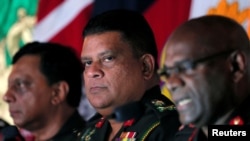Sri Lanka Tuesday rejected as "unwarranted and unacceptable” mounting international criticism of the appointment of a general accused of war crimes as the island nation's army chief.
The foreign ministry called the appointment of Lieutenant General Shavendra Silva as commander of the Sri Lankan army a "sovereign decision" by President Maithripala Sirisena.
"Foreign entities trying to influence the decisions and internal administrative processes of public service promotions in Sri Lanka is unwarranted and unacceptable," the ministry said in a statement.
Colombo added that the international condemnations were "based on allegations".
"Articulating a position of concern... is regrettable and contrary to the principles of natural justice," the ministry added.
The statement came amid a chorus of opposition to Silva, who has been accused by the United Nations of committing war crimes during the final stages of Sri Lanka's separatist conflict.
Silva was the commanding officer of an army division in the island's northern warzone in the final months of the military offensive against Tamil Tiger rebels in 2009.
U.N. rights chief Michelle Bachelet said Monday she was "deeply troubled" by Silva's appointment.
She said it compromised the government's commitment to promote justice and accountability and could jeopardize the island's participation in peacekeeping missions abroad.
The American embassy in Colombo described allegations of gross human rights violations against Silva as "serious and credible".
Sri Lanka's armed forces crushed separatist rebels in 2009 in a no-holds-barred offensive that ended a 37-year war which killed 100,000 people.
There were mass atrocities against civilians in Sri Lanka's predominantly Tamil north towards the end of the conflict, with rights groups saying some 40,000 ethnic Tamils were killed by government forces.
Sri Lanka's successive governments have resisted calls for an independent investigation into the conduct of troops during the final months of the conflict.




